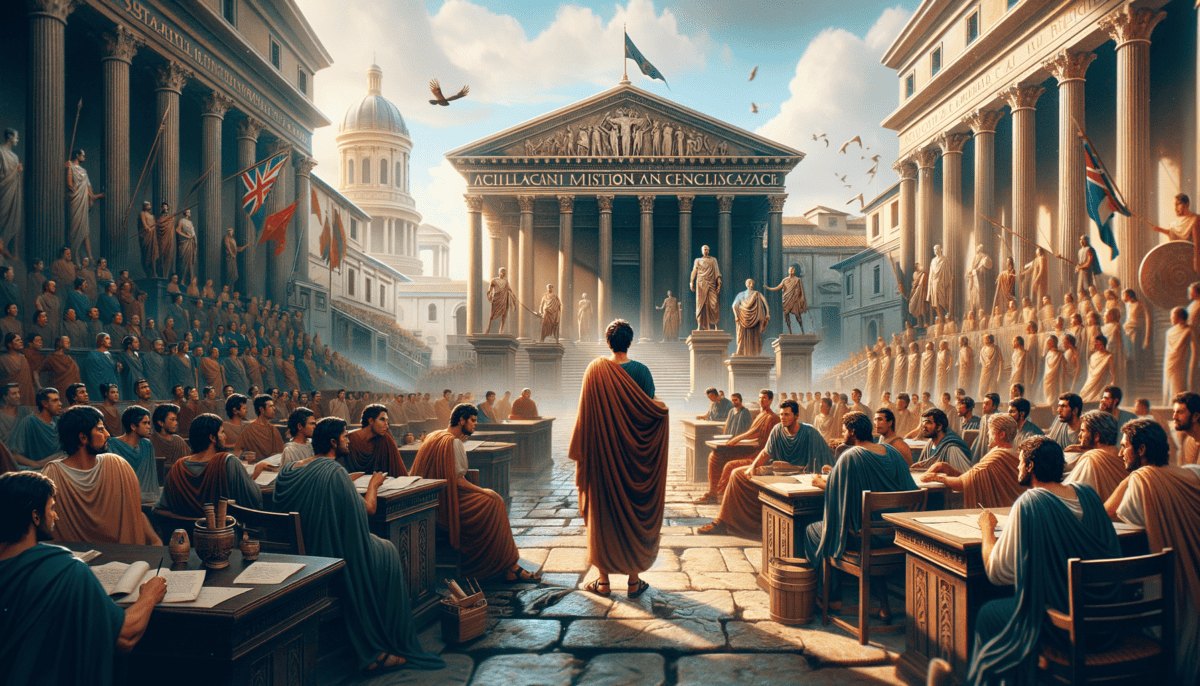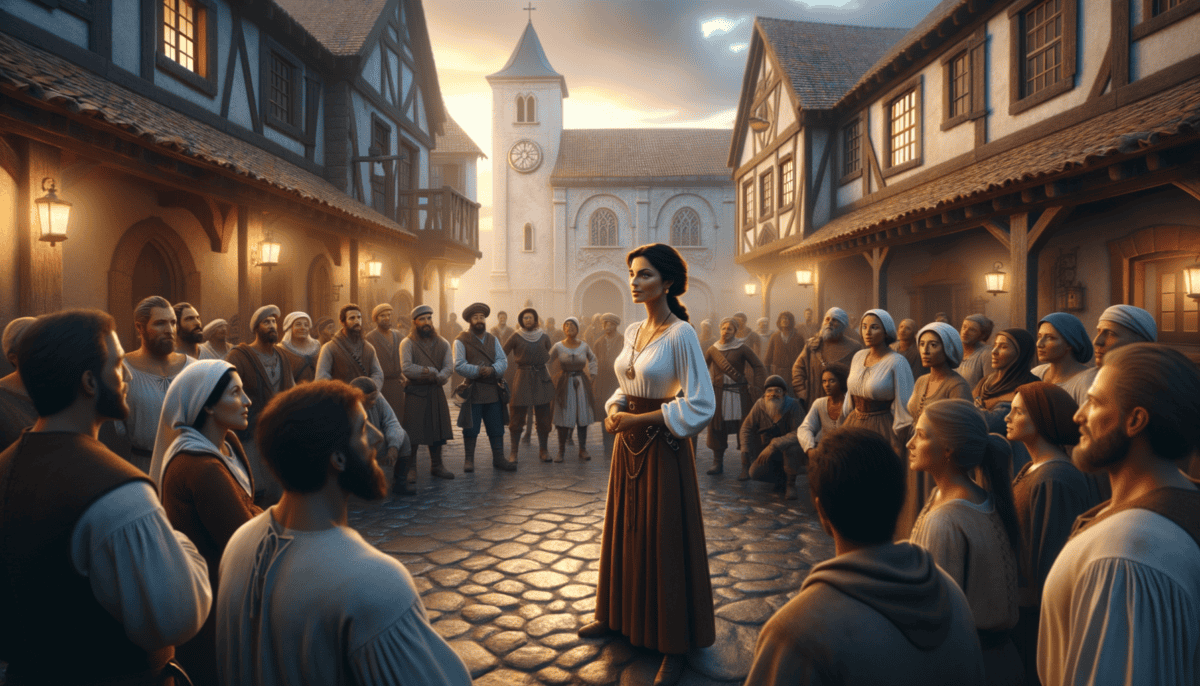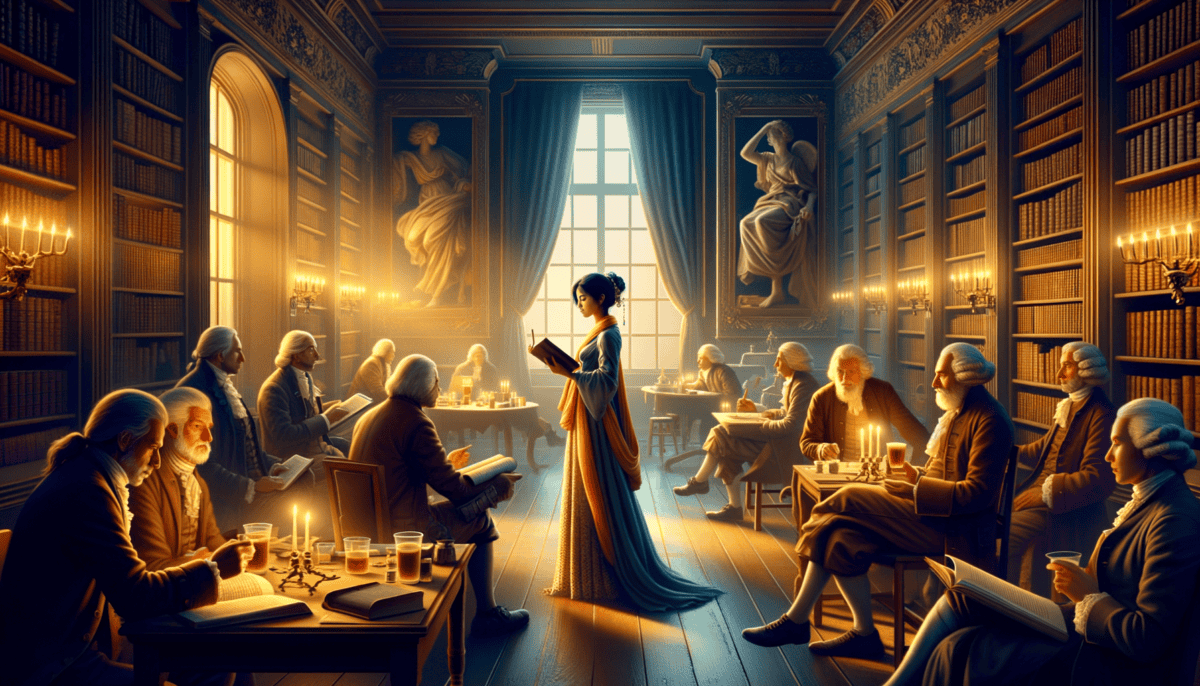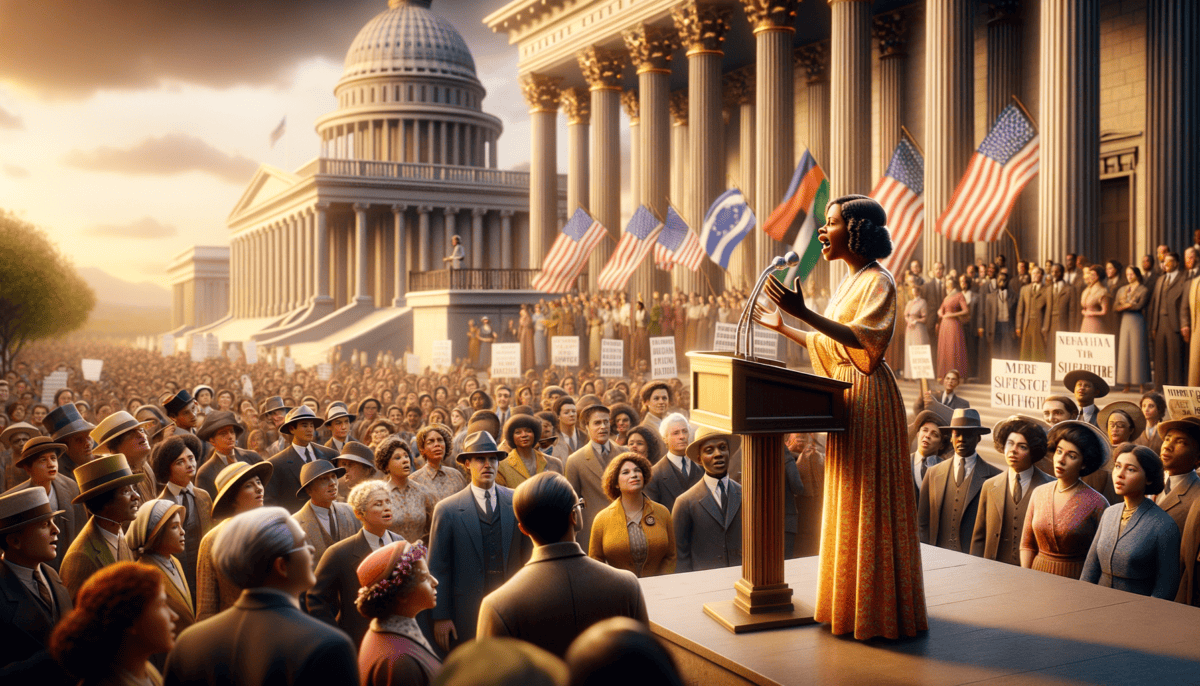The Seeds of Democracy – Athens Awakens
The sun rose over the bustling city of Athens. Young Alexios jumped out of bed, excited for his first day at the Assembly! He was finally old enough to be part of making decisions for his city.
“Today you become a true citizen,” his father said proudly, adjusting Alexios’s white toga. “Remember, in Athens, we all have a voice!”
“But father, what makes Athens so special?” Alexios asked, his eyes bright with curiosity.
His father smiled and led him to their courtyard. “You see, my son, Athens is different from other cities. Here, we don’t have kings telling us what to do. We make choices together!”
As they walked through the busy streets, Alexios saw people heading to the Pnyx hill. This was where citizens met to talk about important things for the city. Some wanted to build new temples, while others wanted better roads.
“Look!” Alexios pointed at the crowd gathering. “There are so many people!”
“Yes,” his father nodded. “That’s democracy. It means ‘power of the people.’ Every citizen gets to speak and vote. It’s like when you and your friends decide what game to play – everyone gets a say!”
At the Assembly, Alexios watched in wonder. Citizens took turns speaking at a big stone platform. They talked about:
- New laws for the city
- Trading with other cities
- ️ Building projects
- ️ How to protect Athens
An older man named Pericles stood up to speak. His voice was strong and clear. “Citizens of Athens! We must decide if we should build a new marketplace!”
Alexios watched as people discussed, debated, and finally voted. He felt proud seeing how his city made choices together. It wasn’t always easy – sometimes people disagreed and argued. But they always found a way to work things out.
“One day,” Alexios thought, “I’ll stand on that platform too. I’ll help make Athens even better!”
As the sun set, father and son walked home. “Democracy is like a garden,” his father explained. “It needs care and attention to grow. Everyone must do their part.”
That night, Alexios dreamed of future assemblies where he would help shape his beloved city. He understood now why Athens was special – it was a place where every citizen’s voice mattered.
Looking out his window at the starlit Acropolis, Alexios smiled. Tomorrow would bring new decisions, new debates, and new chances to be part of something bigger than himself. This was just the beginning of his journey in democracy.
The Roman Forum’s Voice
Marcus adjusted his purple-trimmed toga as he hurried through the bustling streets of Rome. Today was his first day as a young senator, and his heart beat fast with excitement! ️
“The Republic needs fresh voices,” his mentor Claudius had told him. “We do things differently from the Greeks. We choose people to speak for us.”
“But how can just a few people speak for so many?” Marcus wondered aloud.
The massive Forum came into view, its marble columns gleaming in the morning sun. People from all parts of Rome filled the square. Some were rich, others poor, but all were Romans.
Inside the Senate house, Marcus saw the different parts of Roman government at work:
- Senators who made laws
- ⚖️ Consuls who led the city
- ️ Tribunes who spoke for regular people
- Judges who made sure laws were fair
“Look there!” Claudius pointed to two special chairs. “Those are for our consuls. We always have two, so one can’t become too powerful.”
A heated debate began about building new roads. Marcus watched as different senators spoke up for their people back home.
“The people in my district need better roads for their farms!” one senator called out.
“But what about the city streets?” another argued. “They need fixing too!”
Marcus listened carefully. He realized being a representative meant thinking about what was best for everyone, not just a few people.
“Rome is so big,” he said to Claudius. “It would be hard for everyone to come vote like they did in Athens.”
Claudius nodded. “That’s why we choose representatives. It’s like picking team captains for a game – they speak for the whole team!”
As the day went on, Marcus saw how the Roman system worked. Different groups had different jobs, but they all worked together. If the consuls wanted to do something, they needed the Senate to agree. If the Senate made a law, the tribunes could stop it if it wasn’t fair to regular people.
“We call this ‘res publica’,” Claudius explained. “It means ‘public thing’ – because Rome belongs to all of us!”
Marcus stood proudly in his new senator’s toga. He thought about all the people counting on him back home – the farmers, the merchants, the craftsmen. He would be their voice in Rome.
That evening, walking home through the Forum, Marcus watched the sunset paint the marble buildings golden. He understood now that democracy could work in different ways. The Romans had found their own path – one that would influence people for thousands of years to come. ✨
Tomorrow would bring more debates, more decisions, and more chances to help shape the mighty Roman Republic. Marcus couldn’t wait to be part of it all!
Town Square Tales
Elena wiped her hands on her apron as she looked out over the medieval town square. The morning sun cast long shadows across the cobblestones, where people were already gathering. Today was town meeting day!
“Mother, why are so many people coming to the square?” asked Elena’s daughter, Maria.
“Because we all have a say in how our town works,” Elena smiled. “Even with the lords and kings above us, we still make choices about our own village.”
“But I thought only kings made rules?” Maria asked, confused.
“Not always, little one. Watch and learn!” Elena took Maria’s hand as they walked to the town hall.
The old building was packed with townspeople. Bakers, blacksmiths, farmers, and merchants all sat together on wooden benches. The town council members sat at a long table up front.
Building new houses
Sharing farmland
Using the town well
Planning festivals
Helping poor families
“The mill’s wheel is broken again!” announced Thomas the miller. “We need everyone to help fix it.”
Elena stood up. “My husband and his friends can help. But we’ll need wood from the forest.”
The town council wrote everything down. People raised their hands to speak, just like in the old days of Athens and Rome, but now it was about local things that affected their daily lives.
“See, Maria?” Elena whispered. “We may not choose kings, but we choose how to solve our own problems together.”
Soon it was time to talk about the spring festival. Everyone got excited!
“We should have music in the square!” called out old Peter the musician.
“And games for the children!” added Sarah the baker.
Maria’s eyes grew wide. “Everyone gets to help plan the fun?”
“That’s right,” Elena nodded. “When we work together, our town is better for everyone.”
As the meeting went on, they solved more problems. They decided who would repair the bridge, how to help widow Brown after her house burned down, and where to plant new apple trees.
After the meeting, people stayed to talk and share news. Elena introduced Maria to different townspeople.
“This is how we keep our community strong,” Elena explained. “Even with lords and kings far away in their castles, we take care of each other right here.”
Walking home, they passed the town notice board where all the decisions were posted. Elena lifted Maria up to see.
“One day, you’ll help make these decisions too,” she said proudly.
Maria grinned. “I can’t wait! Maybe I’ll even be on the town council like you, Mother!”
The medieval sun set behind the church tower, casting warm light over their little town. Tomorrow would bring new challenges, but together, they would face them all.
Ideas That Changed The World
Sophie rushed through the bustling streets of Paris, clutching a book to her chest. The year was 1750, and new ideas were spreading like wildfire!
“Papa, I’m home!” Sophie called out as she entered their small bookshop. Her father smiled from behind his desk, surrounded by stacks of books.
“What did you learn at the salon today, my curious daughter?” he asked.
Sophie’s eyes sparkled. “We talked about how people should have rights! Like being able to say what they think and choose their leaders!”
The bookshop was a special place where thinkers came to share new ideas. Sophie loved listening to their talks about making the world better. ️
“Madame Lafayette said we should write down rules that protect everyone’s rights,” Sophie explained, opening her notebook.
Everyone is born free
Laws should be fair
People have basic rights
Leaders should listen to the people
Everyone can think for themselves
“But Papa,” Sophie frowned, “why don’t we have these rights now?”
“Because change takes time, little one. But look around – more people are reading and thinking every day!”
Just then, Sophie’s friend Pierre burst into the shop. “Sophie! There’s going to be another meeting tonight!”
That evening, Sophie and Pierre sat quietly in the back of a crowded room. Candles flickered as people talked about freedom and fairness.
“The king shouldn’t make all the choices,” said one speaker. “People should have a voice!”
Sophie wrote everything down in her notebook. These ideas were so different from the old ways!
“Look at this book,” Pierre whispered, showing Sophie a copy of ‘The Social Contract.’ “It says government should work for the people!”
As days passed, Sophie saw more changes. People started newspapers to share ideas. They held meetings to talk about rights. Even women joined the discussions!
“Papa,” Sophie asked one evening, “will these ideas really change things?”
Her father looked thoughtful. “Ideas are powerful, Sophie. They’re like seeds that grow into big trees. These new thoughts about freedom and rights are already growing.”
Sophie helped in the bookshop, watching more people come in to read and learn. She loved seeing their faces light up with understanding.
“Knowledge gives people power,” she told Pierre. “When we know our rights, we can stand up for them!”
One day, a group of students came to the shop. They wanted books about democracy and rights.
“My papa says we’re part of history,” Sophie told them proudly. “These new ideas will make life better for everyone!”
As the sun set over Paris, Sophie sat by her window, writing in her journal. Outside, she could hear people talking about change and hope. The world was waking up to new possibilities!
“Tomorrow,” she thought, “I’ll learn even more. Maybe someday, everyone will have the rights we dream about.”
The Fight For Equal Rights
Rosa stared at the “Colored Only” sign above the water fountain, her heart heavy. The year was 1955 in Montgomery, Alabama.
“Mama,” Rosa asked, “why can’t we drink from the same fountain as everyone else?”
“Because some people think we’re different,” her mother replied softly. “But we’re going to change that.”
Rosa joined the local civil rights group. They met in churches to plan peaceful protests. Everyone wanted the same thing – to be treated fairly.
“We need to stand together,” Miss Johnson, their leader, told them. “Democracy means everyone gets a voice!”
️ Right to vote
End to segregation
Equal schools
Fair jobs
Equal treatment
One day, Rosa got on the bus after work. The driver told her to give up her seat to a white person.
“No,” Rosa said firmly. “I have a right to sit here.”
The police came and took Rosa away, but something amazing happened. The whole Black community stopped riding buses!
“We’ll walk,” people said. “We’ll walk until things change.”
All around the world, people were fighting for their rights. In India, women marched for voting rights. In South Africa, people protested against unfair laws.
“Look,” Rosa’s friend James pointed to the newspaper. “We’re not alone! People everywhere want democracy to work for everyone!”
The protests weren’t easy. Some people were mean. But Rosa and her friends stayed peaceful. ️
“When they go low, we go high,” Miss Johnson always said.
More people joined the movement. They held hands and sang songs about freedom. They wrote letters to leaders asking for change.
“Democracy isn’t real unless everyone can take part,” Rosa told a group of young protesters.
Finally, good news came! Laws started to change. Signs came down. Buses became open to everyone.
“We did it by working together,” Rosa smiled, hugging her mother.
But there was still more work to do. Around the world, people kept fighting for their rights:
“Women should get equal pay!” some shouted.
“Indigenous people should have a voice!” others called.
“Everyone should be able to love who they love!” many declared. ❤️
Rosa watched young people join the movement. They had new ideas and fresh energy.
“Tell us about the old days,” they’d ask.
“The fight for rights never ends,” Rosa would answer. “Each generation makes democracy stronger.”
Years later, Rosa visited a school. The children – all colors sitting together – made her smile.
“Remember,” she told them, “democracy grows when brave people stand up for what’s right.”
Outside the school, Rosa saw people registering to vote. Young and old, all kinds of people, ready to use their democratic rights. ️
“The dream is getting bigger,” she thought. “Now we need to make sure everyone has a chance to be heard.”
A New Digital Dawn
Kai sat in their bedroom, fingers flying across the keyboard. The screen glowed with messages from young activists around the world.
“Hey everyone!” Kai typed. “Ready to make democracy work better?”
More people can share their voice online than ever before in history!
“My grandma Rosa told me about fighting for rights in the 1950s,” Kai shared with the group. “Now we’re fighting in new ways – with keyboards instead of protest signs!”
“Democracy needs to work everywhere – online and offline!” replied Maria from Brazil.
Kai had created an app called “KidVoice” where young people could share ideas about making their schools and towns better.
“Look!” Kai showed their mom. “Kids in Japan want better playgrounds. Kids in Kenya want more books. We’re all connected!”
But the internet had problems too. Some people shared mean things or fake news.
“How do we know what’s true?” asked Tom from Australia in the chat.
“We need to be careful,” Kai typed back. “Let’s check facts and be kind to each other.”
Voting apps
Online town halls
Social media campaigns
✍️ Digital petitions
Virtual meetings
One day, Kai’s class had a special video call with students around the world. They talked about how to make democracy stronger.
“In my country, we vote on phones!” said Lin from Estonia.
“We use apps to tell our mayor what our city needs,” added Sofia from Spain.
Kai learned that democracy was changing with new technology. But some things stayed the same – people working together to make life better. ⭐
Not everyone had computers or phones, though. This was a new problem for democracy.
“We need to make sure everyone can take part,” Kai told their online friends. “No one should be left out of democracy because they don’t have technology.”
The group started a project called “Bridge the Gap.” They helped older people learn about computers and worked to get internet to poor areas.
“Remember what Rosa Parks did?” Kai asked the group. “She didn’t give up. Neither will we!”
Years passed. KidVoice grew bigger. More young people joined in making their world better.
One day, Kai’s grandma Rosa visited. She watched all the young people connecting online.
“You know what?” Rosa smiled. “Democracy is like a tree. It started as a tiny seed in Athens. It grew through Rome and medieval towns. It got stronger during the Enlightenment. It spread its branches during the civil rights movement.”
“And now?” Kai asked.
“Now it’s growing in new ways, reaching more people than ever before. You young people are adding new branches to the tree of democracy.”
Kai looked at their screen. Messages blinked from friends in every time zone. They were all different, but working together for a better world.
“The future of democracy is in your hands,” Rosa said, hugging Kai. “Keep making it stronger. Keep making it work for everyone.”
That night, Kai sent one last message to their global friends:
“Democracy isn’t just about voting anymore. It’s about all of us, everywhere, working together. Let’s keep building bridges, not walls. The journey that started in Athens continues with us!” ✨






